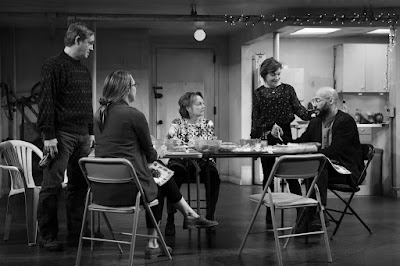 |
| The cast of The Humans (Julieta Cervantes) |
The Humans
Seattle Repertory Theatre
Through December 17, 2017
Stephen Karam has filled his 2016 Tony-award-winning Best
Play, The Humans, with a lot of human
darkness, which then allows for some darkly funny commentary. The play,
starting a national tour at Seattle Repertory Theatre, has a power-house cast
(Richard Thomas, Pamela Reed, Daisy Egan, Lauren Klein, Therese Plaehn, Luis
Vega) portraying an uneasy Thanksgiving family gathering.
In a somewhat stereotypical way, the family has: issues that
complicate the holiday, secrets that get revealed, and sets of disappointed hopes
and dreams of individuals. In less stereotypical ways, the family has: the
oldest member suffering severe dementia that is dealt with in a loving way, a younger
family member with gastrointestinal issues that will best resolve through
surgery that results in an ileostomy – and some plain speaking about it, and a
married couple as the sandwich generation who are in difficult financial
straits.
Brigid Blake (Eagan) and her newish boyfriend, Richard
(Vega) are hosting this Thanksgiving in their newly-moved-into basement
apartment in New York City. Parents Erik (Thomas) and Dierdre (Reed) and sister
Aimee (Plaehn) arrive with “Momo” (Klein), the grandmother who “has good days
and bad days” and today is not a great day.
The apartment is an unusual two-story arrangement, and
lightbulbs keep popping out. Luckily, there is an (unseen) elevator to allow
Momo to be transported up and down the floors. Though the couple has just moved
in, there is enough furnished to keep everyone comfortable.
Slice of Life plays are difficult. “Nothing” often happens,
except a lot of talking and exchanges of information. Exposition can be
awkward. Here, the fact that Richard barely knows the family allows for them to
introduce topics to him and to the audience in a more natural way. The
engagement is in the conversations and the revelations. As each character
relates to each additional character, the history of the family deepens.
Klein was the original Momo on Broadway, and is masterful in
a difficult role. Dementia is not often seen on stage, though I’ll venture a guess
that in coming years, playwrights will write more about these types of folks as
playwrights age and write more about “what they know.”
Reed is an engaging combination of caustic and
compassionate, harried and exhausted. She gets a lot of the fun zingers, though
is the lynchpin of the family. She relates well with Thomas. They make a good
team, as parents.
Plaehn is quite believable as a young woman with a chronic
intestinal disease, struggling to maintain the feeling that she will be
attractive to future companions with a hole in her abdomen. The fact that she
is a lesbian is quite beside the point here, as most plays are becoming less
and less focused on needing to make sexual identity stand out as a family “issue.”
Eagen and Vega make a good couple, with Vega working hard to
connect to the family and show his devotion to his new relationship. Their
interaction is sweet and evenhanded, as power dynamics go.
The parents have the most to manage. They are the sandwich
generation here, trying to keep Momo at home, which is almost too exhausting,
and stay in the parental mode for their daughters. But their situation is far
more vulnerable than the kids know, and the bulk of the secrets are theirs.
However, just as the big secrets come out, the van arrives
to take the family home. There is no time at all to absorb and understand the
implications of the changes in circumstances, or problem solve or decide
anything. In that sense, it’s a brisk 95 or so minutes and then done.
That may allow for the difficulties to discomfit the
audience less, but it doesn’t really allow us to see how this particular family
decides anything of real note. Just at the point where we know enough about how
they function to want to see them work together, the lights go out entirely.
No comments:
Post a Comment
This is a moderated comment section. Any comment can be deleted if the moderator feels that basic civility standards are not being met. Disagreements, however, if respectfully stated, are certainly welcome. Just keep the discussion intelligent and relatively kind.